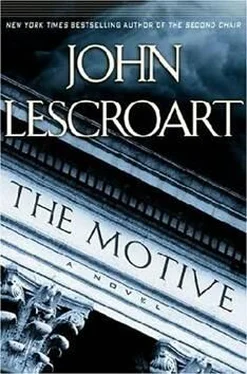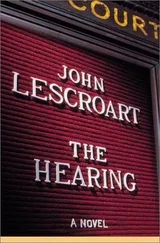"Yes."
"Did you also identify the woman who'd left the Hanover home minutes before the fire from a police lineup held on or about July eleventh of last year? A lineup that included five other women?"
"Yes, I did."
"And would you please tell the members of the jury once again if you see the woman you saw leaving the Hanover home minutes before the fire in this courtroom today?"
"Yes, I do."
"You have already pointed her out to the court, but may I ask you to please do so once again?" She pointed and Rosen said, "Let the record show that the witness has once again identified the defendant, Catherine Hanover. Mrs. Willis, thank you. No further questions." He turned to Hardy. "Recross."
Hardy was in front of her before Rosen had sat down. "Mrs. Willis, when you ID'd the first photo of Missy D'Amiens, you were telling the truth, were you not?"
"Of course I was."
"Of course. And you were as sure of that first ID as you later were of the second, true?"
"Well, at the time…"
"Let me rephrase. Did you express any hesitation or reservation with that first ID?"
"No."
"And that's because you were sure. Correct?"
She didn't like it, but she had to admit it. "At the time, yes, but…"
"So you were sure. As sure as you are now that it was Catherine, correct?"
She didn't answer, and Hardy didn't wait. "But of course you were wrong."
Glitsky wasn't going to deal with any part of the media. He was laying low on this mission. He hadn't done much more than check into his office early in the morning, then disappeared to move on these D'Amiens questions. He wasn't carrying his cell phone and had turned his pager to vibrate.
In the Bank of America's eponymous polished granite building downtown, he now sat in an enclosed cubicle office in the legal department on the eleventh floor. Outside his windows, an immovable cloud blocked any view. Five attorneys and their secretaries worked in the space just outside-the lawyers in their own cubicles about the size of the one Glitsky was using, their slaves at desks against the opposite wall.
Glitsky's guide for his tour of the D'Amiens financials was a serious young woman with mousy brown hair, in a beige suit and Coke-bottle eyeglasses. Probably not yet
thirty, her name was Lisa Ravel and she was the right person to sit with him while they searched. Diligent, knowledgeable about the bank's systems, enthusiastic for the work. She had already printed out the final statement that Glitsky had gotten a look at yesterday at his local branch (they only kept physical records in the branches for two years). Now she suggested that they review deposits over the nearly three-year course of the entire account, moving toward the present.
Glitsky remembered that he wanted to run Missy's Social Security number-find out something more about her-and he called back to his office and asked Melissa to get on it, to page him when she had something. Then he and Ravel began in earnest.
The opening deposit had been in cash for exactly $9,900. Glitsky, who by now was disposed to see a sinister pattern emerging, found that interesting if only because banks were mandated to report any cash transactions of over ten thousand dollars, and this was just under that threshold. At the beginning, now more than four years ago, there'd been very few checks and all of them predictable-to Ruth Guthrie every month for rent, for phone, utilities and the like. Over the next five months, the account had almost gotten down to zero when regular deposits in the thousand-dollar range began turning up. Glitsky, who'd given Ravel an overview of the situation at the outset, said, "I think by now this must be when she's seeing Hanover."
After a while, the deposits started averaging-again, that threshold figure-around nine thousand dollars per month. D'Amiens started making monthly payments on the Mercedes in February of the year before she'd died. Regular deposits and checks started turning up-one every month for twenty months in the six- to eight-thousand-dollar range, but three of them greater than a hundred thousand dollars-to Leymar Construction. Then more standard-size monthly payments to a Macy's credit card, a Nordstrom card. She got a Visa card and started making regular payments on it. Here was a check for $885 made out to the offices of Dr. Yamashiru. Another similar check for $1,435.
Glitsky pointed to the screen. "This guy. He was her dentist," he said. "She must have had teeth problems."
"Looks like bad ones," Ravel said. "And no insurance."
This struck Glitsky. No insurance?
They kept scrolling. "I ought to go get a subpoena for Hanover's accounts while I'm at this," he said. "Compare the construction bills. I think she was taking cash out of her deposits and putting them in her safe-deposit box."
"Well, wait a minute," Ravel said. She hit a few buttons on the keyboard. "There you go." The screen revealed that Glitsky's theory, at least insofar as the deposits went, was correct. The backup record of several of the more normal deposits indicated the cash disbursements from the amount of the checks she'd cashed and deposited. Hanover evidently had written her regular monthly checks to cover both her living expenses (these perhaps unwittingly) and Leymar's contracting fees. The three that were over a hundred thousand dollars were neatly paired with checks she'd written to Leymar in the same amounts less that critical nineteen thousand dollars. The other Leymar checks, though, came in at nineteen thousand dollars per month. Glitsky surmised that she took this money, deposited half in her checking account and the other half-ninety-five hundred dollars a month-into her safe-deposit box. Over the twenty or so months of Hanover's regular payouts to her, this would have come to roughly two hundred thousand dollars.
"So he was supporting her, too," Ravel said.
"Look at what she was stealing," he said. "She wouldn't have needed him to."
"I can't believe the IRS didn't get wind of this somehow."
"I don't know. She kept everything under ten thousand dollars, you notice."
"Okay, but the income."
"Maybe she didn't file."
Ravel shook her head. "Playing with fire."
"She wasn't American. Maybe she didn't get it."
"Well, she may not have been an American," she pointed at the screen, "but that's a real Social Security number."
"Which reminds me."
Glitsky called back to his office, where Melissa had gone to lunch. Leaving another message, he got back to their computer.
Finally, at it for almost two hours now-printing out pages as they went, the two of them getting along, theorizing-they got to the last month's closing statement again. At his belt, he felt his buzzer. "That's my secretary." But checking the number, it wasn't. It was Hardy.
Glitsky called him right back.
"I just thought of something you said this morning," Hardy said. "You know the car?"
"I know the car."
"We still don't know where it is."
"Yes we do. Somebody stole it."
Disappointment sounded through the line. "You know that for sure?"
"No. I deduced it since it's nowhere else. Somebody must have taken it, and there wasn't anybody to complain."
"So it's not been reported stolen?"
"Good, Diz. I think I just said that. What's your point?"
"My point is where did you look?"
Glitsky fought the rise of impatience. "You want a list? I looked. Traffic and parking, warrants, booted vehicles, towed vehicles…"
"Where? What towed vehicles?"
"At the tow lots."
"Yeah, but for both companies?"
A hint of anger leaking through now, Glitsky began, "What do you…?" Then stopped, realizing in a flash that if the car had been towed in the first few weeks after the fire, it would have naturally gone to the Tow/Hold lot. But less than six weeks later, Bayshore AutoTow had taken over, and since that's where the city now towed its cars, that's where Glitsky had checked. The transition after the contract change to the city's new towing company had gone anything but smoothly, with records lost or mislaid, cars dismantled or stolen. With Tow/Hold dragging its feet supplying anything that would help Bay-shore become efficient and productive, the city's computer hadn't come close to catching up and didn't look like it would for a while. "Tow/Hold," Glitsky said. "Just a thought," Hardy said.
Читать дальше












